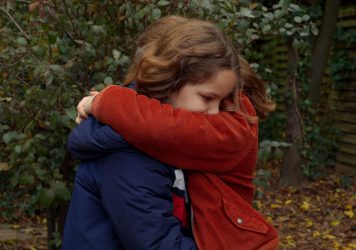A woman returns home to care for her ailing father, where the past confronts her in strange ways in Francisca Alegria's feature debut.
Chilean filmmaker Francisca Alegría heeds the call for environmental consciousness and action in her beguiling new feature The Cow Who Sang A Song Into The Future, a magical realist fable about what it means to protect the harmony of the natural world.
As shoals of singing fish wash up on the shores of the Río Cruces, dying from the polluted water, a woman emerges from the deep, gasping for air. Elusively mute, Magdalena (Mía Maestro) was believed to have been dead for many years and returns to society where her presence has a strange effect on the objects and people around her; microwaves and mobile phones come to life when she passes, people fall into uncontrollable fits of laughter, and when her former husband catches sight of her, he collapses from the surprise.
To take care of him, his daughter Cecilia (Leonor Varela) and her two children travel to the town where she and brother Bernardo (Marcial Tagle) grew up, while Bernardo takes over the care of their father’s dairy farm in his absence, turning a blind eye to the terrible warning posed by the dead fish for his cattle. Neither of the siblings believe their mother could have returned, but their own eventual sightings of her bring up long-buried pain and hidden family secrets.
As a folkloric meditation on the relationship between human and environment, mother and child, Alegría’s film has an earthly mystical quality to it, moving through its minimal plot with fluidity and enticement. The forest setting is lit with an acidic green glow that hints at otherworldliness as well as an environment under threat, and characters stumble into dreamlike scenarios that deliver a vision of the world they hope to live in. But underneath these loftier conceits is a deeply emotional narrative about familial relationships and motherhood that occasionally suffers from obliqueness but emerges by the end of the film as poignant commentary.
Magdalena’s return coincides with the habitat’s decline, positioning her as a kind of eco-prophet, or Mother Earth allegory, on a restorative mission. The trauma of losing her mother from a young age had hurt Cecilia seemingly beyond repair and affected her relationship with her own children, particularly her eldest who is transgender. Alegría deftly ties together Cecilia’s feelings of abandonment and her lack of compassion with the environmental crisis occurring, a comparison which suggests heavy-handedness but is delivered with subtlety and care.
Even in its abstractness, The Cow Who Sang a Song Into the Future is a curious film that encourages introspection and offers a hopeful vision for collective healing. In one of the film’s most moving scenes, Cecilia succumbs to her tears in an enclosure for the calves separated from their mothers on the dairy farm. The uncertain cows approach with caution but soon warm to her as she cries for everything she and they have lost. It’s an emotional realisation that alters her outlook on the world that currently exists for her children and helps her understand her own failings in order to start again.
Little White Lies is committed to championing great movies and the talented people who make them.
Published 23 Mar 2023
Who wouldn't be intrigued by that title?
A beguiling environmental fable, bolstered by an emotional family drama narrative.
An interesting example of climate-conscious cinema, if a little too abstract at times.

By Aimee Knight
Céline Sciamma puts a time-loop spin on the classic coming-of-age tale with this gentle family fairy tale.

Léa Mysius crafts an enigmatic tale about a young girl with a magical sense of smell in her auspicious second feature.

What is the role of documentaries that try to change the way we think, and do they actually work?